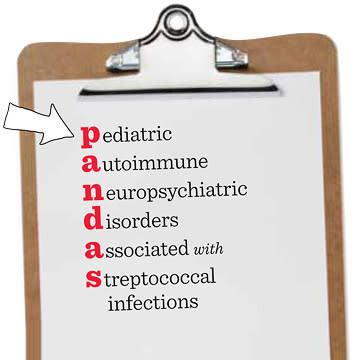PANDAS: Is This Condition Real?

We've been hearing a lot these days about a disorder called PANDAS. Maybe you've read about 15 teenagers in upstate New York who suddenly developed what was originally described as a tic disorder? It's now believed to be PANDAS.
PANDAS stands for Pediatric Autoimmune Neuropsychiatric Disorder Associated with Streptococcal Infections. Essentially it means that for some children, being exposed to a bacterial infection such as strep can trigger severe symptoms of OCD. How? The infection triggers the immune system to produce antibodies intended to attack the infection. But the antibodies attack the brain instead-specifically, the basal ganglia, which is the part that controls emotions, behaviors, and physical movements.
It's turned out to be a very controversial diagnosis. Some doctors say there just isn't enough evidence to prove that strep or a similar infection can lead to OCD. Or that the studies proving its existence are flawed. They'll say that the children who are "suddenly" acting vastly differently have probably been showing signs of OCD for months or years, and the parents just haven't picked up on them.
We've just published a report on PANDAS, and the moms in our story would beg to disagree. They say their child's personality radically changed-from one day to the next, literally. (PANDAS researchers say that's the number-one hallmark of the disorder.) Can you imagine your previously well-adjusted second-grader becoming terrified of, say, radiation poisoning from the electronic devices in your home? That happened to one of the families in our article. What would you do if your happy-go-lucky 5-year-old started regularly kicking, hitting, and spitting at you and her siblings? That's another example from our piece.
Despite the growing body of research behind PANDAS, and from organizations as esteemed at the National Institute of Mental Health, there's lots that experts don't know. For one thing, no one knows how common it is. Some experts say it affects up to 30 percent of all children with OCD (which affects between 1 and 2 percent of children). Others will go so far as to say it's as prevalent as autism, and that doctors just don't understand the condition well enough to diagnose it. Another sticking point: treatment. While some kids with PANDAS can be successfully treated with an extended course of antibiotics-because it halts the antibodies going after the brain-others take the meds long-term (as in months or years). This brings up the problem of antibiotic resistance, and doctors are not in agreement as to how risky long-term antibiotic use is.
When children don't respond to antibiotics, parents can consider giving their child intravenous immunoglobulin (IVIG) therapy, thought to boost the immune system by delivering concentrated amounts of antibodies from healthy blood donors. But IVIG is expensive and not usually covered by insurance, and not studied well enough for doctors to know exactly how many treatments are needed. And it doesn't always work.
Some parents don't buy PANDAS, either. When we posted our story on Facebook, some moms and dads expressed concern that PANDAS is just another way to excuse a poorly behaved child. Others said that there's nothing odd about a kid who acts differently when he's sick-though our story explains that the children don't show signs of OCD until after their illness. We know this much: The topic generates a lot of passion, a lot of theories, and a lot of misinformation. When you read our story, let us know what you think.
Click to see an in-depth report on PANDAS.
Related:
This article first appeared on Parents.com.
